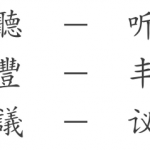Articles in the ‘Beginner’ category Page 38
-
When perfectionism becomes an obstacle to progress
Perfectionism is usually regarded as something positive, perhaps even necessary. Scoring 100% on an exam is good, isn’t it? No, it’s not. In this article, I explain why perfectionism is bad when learning a language. Aiming for 90% is far better than aiming for 100%. This is being smart, not lazy.
Read → -
Making progress in Chinese in spite of praise
Praise is a double-edged sword. On the one hand, it’s encouraging and makes it more rewarding to study. On the other hand, however, if you use other people’s praise as a true indication of your own ability, you’re in deep trouble. Feel encouraged, but it’s essential that you don’t trust native speakers when they tell you your Chinese is great!
Read → -
Learning simplified and traditional Chinese
Learning traditional characters if you know simplified or vice versa is a lot easier than beginners tend to think. Generally, you don’t need to worry, because at an advanced level, learning both is quite easy. This article is about simplified/traditional and how to learn both.
Read → -
Learn by exaggerating: Slow, then fast; big, then small
If you want to speak or write quickly, you should start out by doing it slowly. Mimicking native speed early will just lead to sloppy language and bad communication. Expose your errors so that you have a chance to correct them.
Read → -
Can you become fluent in Chinese in three months?
Can you (or Benny Lewis) become fluent in Chinese in three months? I think the answer is no, but instead of just being negative, I’ve tried to describe some problems and offer some help on how to solve them.
Read → -
If you want to master Chinese, make long-term investments
It’s easy and perhaps natural to spend the minimum amount of effort to overcome a problem, but this will bring problems in the long run. If we want to reach long-term goals such as mastering Chinese, we need to adopt a long-term approach. What makes sense to pass your next exam isn’t necessarily what makes sense if you want to really learn what you’re studying.
Read → -
The tones in Mandarin are more important than you think
Tones are more important than most people think. Just because native speakers reduce tones and speak quickly, it doesn’t mean that you can do the same and get away with it. Don’t be fooled by people who say that tones in Chinese aren’t as important as all that, because they’re wrong.
Read → -
About opening doors and the paths beyond
Hacking Chinese is about opening doors and showing the paths beyond, but what does that mean? Why is it useful to read other people’s advice? In this article I argue that it’s essential to familiarise oneself with many different methods, not to find the correct way of doing something, but to find better ways and provide contrast to one’s own learning process.
Read → -
Enjoying the journey while focusing on the destination
Everybody has different reasons for studying Chinese, but whatever the final goal is, it is important to make the journey interesting as well. Enjoying studying isn’t simply a cliché, it’s quite necessary if you want to invest the time needed to master a language. This article discusses the journey, the destination and the relationship between them. To put it briefly: don’t forget to look at the view.
Read → -
Learning Chinese the holistic way: Integrating knowledge
Holistic learning is about integrating what you learn into a web of things you already know and thus making it much easier to learn and remember. This is in contrast with traditional education methods which often emphasise isolated facts and don’t make proper use of what learners already know.
Read →









